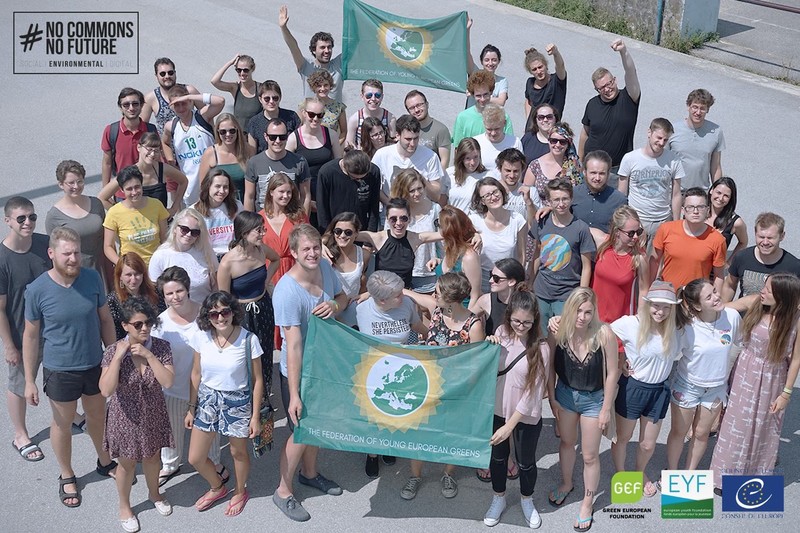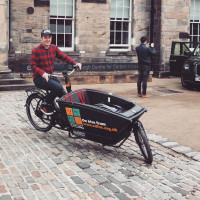
DEFINITION: A common is a resource/object that is commonly managed by a community e.g. forests, oceans, education, the internet, transport etc.

At the end of July I was lucky enough to be able to attend the Federation of Young European Greens (FYEG) Summer Camp in Croatia. It was my first ever visit to the Balkans which is a stunning place and the camp was an amazing experience! There were more than 50 participants from over 25 European countries from FYEG, Cooperation and Development Network Eastern Europe (CDN) and other like-minded organisations.
The camp was themed around the ‘environmental commons’ and the week was a mixture of workshops, lectures and problem-solving sessions plus working groups on specific aspects of commons. We covered a range of topics including; fighting for natural commons, gender & climate, communicating the climate crisis, water as a commons, access to land, the future of the Paris Climate Agreement and commons in the Balkans. It was really interesting when people shared their own experiences of environmental commons, in some ways we are in a better position on Scotland with the Outdoor Access Code and but in others we are worse off e.g. hugely concentrated land ownership, derelict urban land due to speculation, cost of housing etc. The Scottish Green Party is already strong on these issues and is pushing for change, but it was inspiring to hear from our European neighbours on what could be possible.
I was part of the “Personal Action and Political Change” sub-committee on transport which I found really interesting and it allowed me to build upon my existing knowledge on the subject. During the transport working group at the camp, we discussed a range of solutions that we continue to develop and hopefully advance to a European Citizens Initiative (ECI). I decided to focus this short blog on this area, looking briefly at how sustainable transport can be a commons which can benefit us all.
In putting forward the narrative of the commons we can often experience significant inertia from a society that has been wired to think differently under the neoliberal paradigm. When the conservatives project neoliberalism onto society it encourages people to act as individuals and discourages collectivism. Whilst in reality we know that humans are social and we can achieve so much more through cooperation - this extends to services which we can radically transform to deliver far greater benefits to society.
In Edinburgh we can see a bus system that is publicly-owned and is often considered one of the best bus operators in the UK. Whilst it’s not perfect, compared to the bus systems in Aberdeen and Glasgow it is way ahead in terms of value for money, ease of use and network coverage plus the drivers are trained on how to responsibly interact with cyclists! When I am lucky enough to travel to other parts of Europe, I’m always struck by how much cheaper, simpler and nicer the train networks tend to be. In Scotland but particularly in England we are faced with an array of private operators which can confuse the process of taking a journey and we haven’t even mentioned the continually rising ticket prices yet!
In the UK as we have had 30 years of a neoliberal hegemony and any break from this toxic political legacy is shunned as too dangerous or far too radical - even though nationalising the railways enjoys widespread public support. Whilst if we look to our European neighbours, they see ideas like nationalised railways as perfectly normal. Green policies often embody the spirit of the commons as we have long supported nationalising the railways, once these are back in public control; trains will be run with a focus on delivering a service to society not generating profit for private shareholders. It gives us an important chance to make sustainable travel much more affordable and desirable, making it easier for people to rely on public transport. This will be better for our polluted and congested city centres which should actively prioritise the movement of people not vehicles as we conduct participative urban planning going forward.
Air travel is one of the sources of emissions and plans to grow this sector and expand/build new airports seriously jeopardise meaningful action on climate targets. We need to recognise that approximately 70% of aviation emissions are attributed to the 15% of flyers, which are mostly regular business passengers. We each have a carbon allowance if we are to meet the Paris climate targets, so measures to target the aviation sector should consider this disproportionate percentage. We considered this challenge during the camp and whilst trains are more sustainable than air travel, they can often be more expensive. So a push towards greater public control and integrated pan-European ticketing is a future we agreed we’d like to see.
Another factor we considered was that people often use air travel for holidays because of the rigid nature of annual leave, to make the best use of limited time, air travel is often more viable than train travel. Through the ECI and by working with MEPs, trade unions, workers and environmental organisations, we hope to embed more flexible annual leave where you can get more time off work for holidays if you take sustainable travel – with the time issue minimised, it becomes a more desirable option.
With the climate crisis, dangerous levels of air pollution and congested streets it’s clear that the dominance of car-centric transport planning cannot continue. We need to implement a range of solutions to release our cities from the shackles of single-occupancy private vehicles, making our civic spaces, cleaner, more pleasant and accessible. Whilst if we consider rural areas; for too long private transport operators have been able to cut lifeline bus services - better regulation and public ownership can change this. Although I’m currently part of Edinburgh Young Greens, I’m originally from Aberdeen; the Northeast and Highlands require vast improvements to the rail network as we rarely have double rail tracks never mind fast & modern electric trains! The Scottish Government’s mild obsession with building big new roads needs to stop, with greater investment in low carbon projects required to increase. With the number of people without access to a car on the increase and the climate crisis making this a less viable option anyway, we need to develop a transport network which considers the common benefits to society; so the focus needs to be on active travel (walking & cycling) and sustainable transport (e.g. buses, trams & trains).
Issues around transport, energy and land in the age of the anthropocene (and with the climate crisis already upon us) will require cooperation and greater participative democratic measures. By fostering the narrative of the commons, we can all benefit and work towards a sustainable future.
SYG video update from the summer camp - https://www.facebook.com/ScotYGreens/videos/1020604751433337/
Some articles on how all this links to SGP:
- https://greens.scot/our-railways
- https://greens.scot/better-buses
- https://greens.scot/news/harvie-challenges-snp-mps-on-heathrow-after-labour-changes-stance
- https://greens.scot/blog/wouldn-t-it-be-great-if-scotland-became-known-as-the-country-that-cracked-congestion
- https://greens.scot/blog/for-bike-week-4-things-we-will-do-to-boost-walking-and-cycling
- https://greens.scot/blog/6-things-the-transport-bill-could-deliver
- https://greens.scot/blog/it-s-time-for-bus-reregulation-and-a-public-transport-system-run-for-everyone
- https://greens.scot/blog/our-updated-active-travel-policy-shows-our-commitment-to-making-communities-safer-and-healthier
